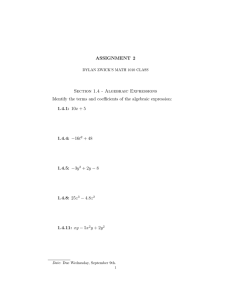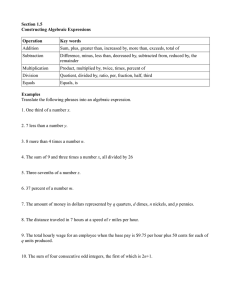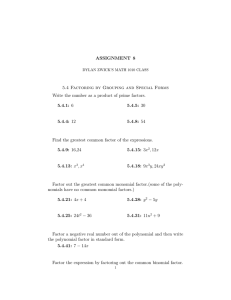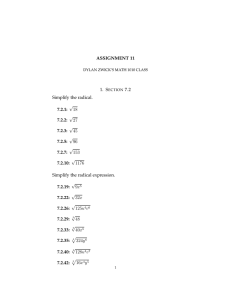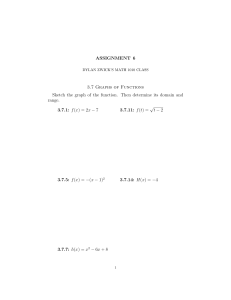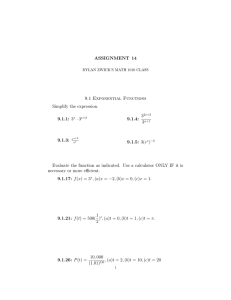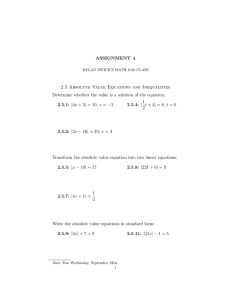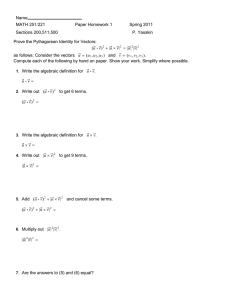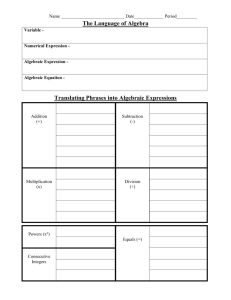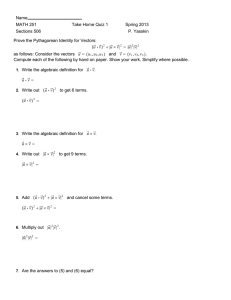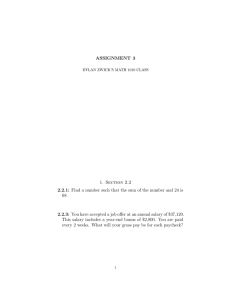ASSIGNMENT 2 Section 1.4 - Algebraic Expressions
advertisement
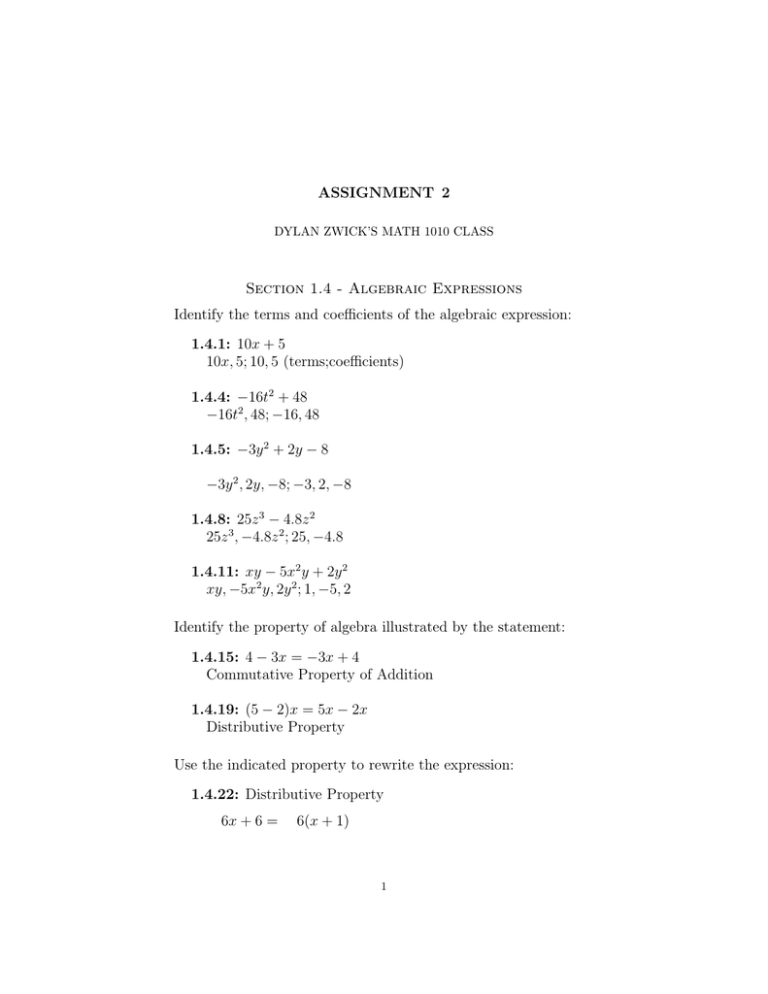
ASSIGNMENT 2 DYLAN ZWICK’S MATH 1010 CLASS Section 1.4 - Algebraic Expressions Identify the terms and coefficients of the algebraic expression: 1.4.1: 10x + 5 10x, 5; 10, 5 (terms;coefficients) 1.4.4: −16t2 + 48 −16t2 , 48; −16, 48 1.4.5: −3y 2 + 2y − 8 −3y 2 , 2y, −8; −3, 2, −8 1.4.8: 25z 3 − 4.8z 2 25z 3 , −4.8z 2 ; 25, −4.8 1.4.11: xy − 5x2 y + 2y 2 xy, −5x2 y, 2y 2 ; 1, −5, 2 Identify the property of algebra illustrated by the statement: 1.4.15: 4 − 3x = −3x + 4 Commutative Property of Addition 1.4.19: (5 − 2)x = 5x − 2x Distributive Property Use the indicated property to rewrite the expression: 1.4.22: Distributive Property 6x + 6 = 6(x + 1) 1 2 DYLAN ZWICK’S MATH 1010 CLASS Simplify the expressions by combining like terms: 1.4.25: 3x + 4x 7x 1.4.29: 7x − 11x −4x 1.4.33: 3x − 2y + 5x + 20y 8x + 18y 1.4.36: 9y + y 2 − 6y y 2 + 3y 1.4.39: x2 + 2xy − 2x2 + xy + y −x2 + 3xy + y Use the Distribution Property to simplify the expressions: 1.4.41: 4(2x2 + x − 3) 8x2 + 4x − 12 1.4.42: 8(z 3 − 4z 2 + 2) 8z 3 − 32z 2 + 16 1.4.46: −(−5t2 + 8t − 10) 5t2 − 8t + 10 1.4.49: 3x(17 − 4x) 51x − 12x2 Simplify the expression: 1.4.53: 10(x − 3) + 2x − 5 12x − 35 1.4.58: 7x − (2x + 5) 5x − 5 1.4.62: x(x2 − 5) − 4(4 − x) x3 − x − 16 ASSIGNMENT 2 3 1.4.65: 9a − [7 − 5(7a − 3)] 44a − 22 1.4.69: 8x + 3x[10 − 4(3 − x)] 12x2 + 2x 1.4.72: 5[3(z + 2) − (z 2 + z − 2)] −5z 2 + 10z + 40 Evaluate the expression for the specified values of the variable(s). If not possible, state the reason: 1.4.73: 5 − 3x 2 (a) x = , 3 3 (b) x = 5, −10 1.4.75: 10 − 4x2 (a) x = −1, 6 1 (b) x = , 9 2 1 1.4.79: 2 + 3 x (a) x = 0, Not possible;undefined (b) x = 3, 28 9 1.4.81: 3x + 2y (a) x = 1, y = 5, 13 (b) x = −6, y = −9, −36 1.4.84: y 2 + xy − x2 (a) x = 5, y = 2, (b) x = −3, y = 3, −11 −9 4 DYLAN ZWICK’S MATH 1010 CLASS 1.4.85: y2 x −x (a) x = 4, y = 2, Not possible, undefined (b) x = 3, y = 3, 1 2 1.4.88: |x2 − y| (a) x = 0, y = −2, (b) x = 3, y = −15, 2 24 Evaluate the expression 0.01p + 0.05n + 0.10d + 0.25q to find the value of the given number of pennies p, nickels n, dimes d,and quarters q: 1.4.97: 43 pennies, 27 nickels, 17 dimes, 15 quarters $7.23 Section 1.5 - Constructing Algebraic Expressions Translate the verbal phrase into an algebraic expression: 1.5.1: The sum of 23 and a number n 23 + n 1.5.5: Six less than a number n n−6 1.5.7: Four times a number n minus 10 4n − 10 1.5.12: The ratio of y and 3 y 3 1.5.16: The number u is tripled and the product is increased by 250 3u + 250 1.5.19: The sum of a number and 5, divided by 10 n+5 10 ASSIGNMENT 2 5 Write a verbal description of the algebraic expression without using the variable: 1.5.25: t − 2 A number decreased by 2 1.5.28: 2y + 3 Three more than the product of a number and 2 1.5.30: 7y − 4 Four less than seven times a number 1.5.33: 4 x 5 Four-fifths of a number x + 10 1.5.37: 3 The sum of a number and ten, divided by 3 Write an algebraic expression that represents the specified quantity in the verbal statement,and simplify if possible: 1.5.41: The amount of money (in dollars) represented by n quarters 0.25n 1.5.45: The amount of money (in cents) represented by m nickels and n dimes 5m + 10n 1.5.47: The distance traveled in t hours at an average speed of 55 miles per hour 55t 1.5.50: The average rate of speed when travelling 320 miles in t hours 320 t 1.5.51: The amount of antifreeze in a cooling system containg y gallons of coolant that is 45% antifreeze 6 DYLAN ZWICK’S MATH 1010 CLASS 0.45y 1.5.55: The sale price of a coat that has a list price of L dollars if it is a ”20 % off” sale L − 0.20L = 0.80L 1.5.57: The total hourly wage for an employee when the base pay is $8.25 per hour plus 60 cents for each of q unit produced per hour 8.25 + 0.60q 1.5.59: The sum of a number n and five times the number n + 5n = 6n 1.5.62: The sum of three consecutive even integers, the first of which is 2n 2n + (2n + 2) + (2n + 4) = 6n + 6 Section 2.1 - Linear Equations Determine whether each value of the variable is a solution of the equation: 2.1.1: 3x − 7 = 2 (a) x = 0 Not a solution (b) x = 3 Solution 2.1.2: 5x + 9 = 4 (a) x = −1 Solution (b) x = 2 Not a solution 2.1.4: 10x − 3 = 7x (a) x = 0 Not a solution (b) x = −1 Not a solution ASSIGNMENT 2 7 Identify the equation as a conditional equation, an identity, or an equation with no solution: 2.1.7: 6(x + 3) = 6x + 3 No solution 2.1.9: 2 1 x + 4 = x + 12 3 3 Conditional Determine whether the two equations are equivalent. Explain your reasoning; 2.1.13: 3x = 10, 4x = x + 10 Equivalent 2.1.15: x + 5 = 12, 2x + 15 = 24 Not equivalent 2.1.17: 3(4 − 2t) = 5, 12 − 6t = 5 Equivalent 2.1.20: 6 − 5x = −4, x = −4 Not equivalent Solve the equation. If there is exactly one solution, check your answer. If not, describe the solution: 2.1.23: 3x − 12 = 0 4 2.1.25: 6x + 4 = 0 2 − 3 2.1.29: 4y − 3 = 4y No Solution;−3 6= 0 2.1.35: 3x − 1 = 2x + 14 15 8 DYLAN ZWICK’S MATH 1010 CLASS 2.1.37: 8(x − 8) = 24 11 2.1.45: 7(x + 6) = 3(2x + 14) + x Infinitely many;both sides of the equation equal 7x + 42 2.1.47: t − 2 3 = 5 2 t = 19/10 2.1.50: t t + =1 6 8 t = 24/7 2.1.53: 0.3x + 1.5 = 8.4 23 Solve the problems: 2.1.59: Number Problem The sum of two consecutive integer is 251. Find the integers. Let the two integers be n and n + 1, then n + (n + 1) = 251 we have 2n + 1 = 251, or n = 125. so the integers are 125 and 126. 2.1.63: Work Rate Two people can complete a task in t hours, t t where t must satisfy the equation + = 1.Find the required 10 15 time t. t=6 2.1.71: True or False? Multiplying each side of an equation by zero yields an equivalent equation. Justify your answer. False, because this does not follow the Multiplication Property of Equality.
